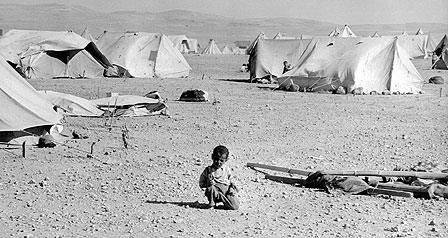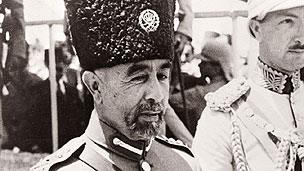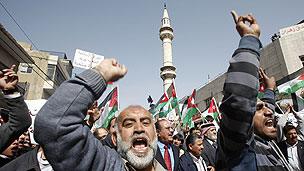Jordan profile - Timeline
- Published
A chronology of key events:
1922 - The Council of the League of Nations recognizes Transjordan as a state under British supervision.

Shortly after gaining independence Jordan became home to hundreds of thousands of Palestinian refugees
1946 - The United Nations recognizes Jordan as an independent sovereign kingdom.
1948 - State of Israel created in British-mandate Palestine. Thousands of Palestinians flee Arab-Israeli fighting to West Bank and Jordan.
1950 - Jordan annexes West Bank.
1951 July - King Abdullah assassinated by Palestinian gunman angry at his apparent collusion with Israel in the division of Palestine.

King Abdullah - Jordan's first monarch - was assassinated in 1951
1952 August - Hussein proclaimed king after his father, Talal, is declared mentally unfit to rule.
1957 - British troops complete their withdrawal from Jordan.
1967 - Israel takes control of Jerusalem and West Bank during Six-Day War, major influx of refugees into Jordan.
1970 - Major clashes break out between government forces and Palestinian guerrillas resulting in thousands of casualties in civil war remembered as Black September.
1972 - Attempted military coup thwarted.
1986 - Hussein severs political links with the PLO and orders its main offices to shut.
1989 - Rioting in several cities over price increases.
1989 - First general election since 1967, contested only by independent candidates because of the 1963 ban on political parties.
Peace deal signed
1994 - Jordan signs peace treaty with Israel, ending 46-year official state of war.
1996 - Food price riots after subsidies removed under economic plan supervised by the International Monetary Fund.
King Hussein dies
1999 February - King Hussein dies, his eldest son Crown Prince Abdullah succeeds to the throne.
2000 September - A military court sentences six men to death for plotting attacks against Israeli and US targets.
2001 March - King Abdullah and presidents Bashar al-Assad of Syria and Hosni Mubarak of Egypt inaugurate a $300m (£207m) electricity line linking the grids of the three countries.
2002 January - Riots erupt in the southern town of Maan, the worst public disturbances in more than three years, following the death of a youth in custody.
2002 September - Jordan and Israel agree on a plan to pipe water from the Red Sea to the shrinking Dead Sea. The project, costing $800m, is the two nations' biggest joint venture to date.
2002 October - Senior US diplomat Laurence Foley is gunned down outside his home in Amman by al-Qaeda fighters, in the first assassination of a Western diplomat in Jordan. Scores of political activists are rounded up.
2003 June - First parliamentary elections under King Abdullah II. Independent candidates loyal to the king win two-thirds of the seats.
2004 February - King Abdullah and Syrian President Bashar al-Assad launch the Wahdah Dam project at a ceremony on the River Yarmuk.
Terror
2004 April - Authorities seize cars filled with explosives and arrest several suspects said to be linked to al-Qaeda and planning chemical bomb attack on intelligence services HQ in Amman.
2005 March - Jordan returns its ambassador to Israel after a four-year absence. Amman recalled its envoy in 2000 after the outbreak of the Palestinian uprising.
2005 April - A new cabinet is sworn in, led by Prime Minister Adnan Badran, after the previous government resigns amid reports of the king's unhappiness over the pace of reforms.
2005 August - Al-Qaeda fires three missiles from inside Jordan, two of which narrowly miss US naval vessels at the port of Aqaba while the third lands near Eilat airport in Israel. A Jordanian soldier is killed.
2005 November - Sixty people are killed in suicide bombings at three international hotels in Amman. Al-Qaeda in Iraq claims responsibility. Most of the victims are Jordanians. A day of mourning is declared.
2006 June - Iraq's prime minister announces that Jordanian-born Abu Musab al-Zarqawi, the leader of al-Qaeda in Iraq, has been killed in an air strike.
2007 July - First local elections since 1999. The main opposition party, the Islamist Action Front, withdraws after accusing the government of vote-rigging.
2007 November - Parliamentary elections strengthen position of tribal leaders and other pro-government candidates. Fortunes of the opposition Islamic Action Front decline. Political moderate Nader Dahabi appointed prime minister.
2008 August - King Abdullah visits Iraq. He is the first Arab leader to visit the country since the US invasion in 2003.
Reform and protests
2009 November - King dissolves parliament half-way through its four-year term
2009 December - King Abdullah appoints new premier to push through economic reform.
2010 May - New electoral law introduced. Pro-reform campaigners say it does little to make system more representational.
2010 October - Leader of Islamist militant group jailed for plotting attacks on the army.

Jordan experienced its own Arab Spring protests
2010 November - Parliamentary elections, boycotted by the opposition Islamic Action Front. Riots break out after it is announced that pro-government candidates have won a sweeping victory.
2011 January - Tunisian street protests which unseat the president encourage similar demonstrations in other countries, including Jordan.
2011 February - Against a background of large-scale street protests, King Abdullah appoints a new prime minister, former army general Marouf Bakhit, and charges him with carrying out political reforms.
2011 October - Protests continue through the summer, albeit on a smaller scale, prompting King Abdullah to replace Prime Minister Bakhit with Awn al-Khasawneh, a judge at the International Court of Justice.
2012 April - Prime Minister Awn al-Khasawneh resigns abruptly, have been unable to satisfy either demands for reform or establishment fears of empowering the Islamist opposition. King Abdullah appoints former prime minister Fayez al-Tarawneh to succeed him.

Thousands fleeing the conflict in Syria have taken refuge in camps in Jordan
2012 October - King Abdullah calls early parliamentary elections for January. The Muslim Brotherhood's political wing, the Islamic Action Front, decides to continue to boycott them in protest at unequal constituency sizes and lack of real parliamentary power. The King appoints Abdullah Ensour, a former minister and vocal advocate of democratic reform, as prime minister.
2012 November - Clashes between protesters and supporters of the king follow mass demonstrations in Amman against the lifting of fuel subsidies, at which calls for the end of the monarchy are heard. Three people are killed.
2013 January - Pro-government candidates victorious in parliamentary elections which are boycotted by the main opposition Islamic Action Front.
2013 March - New government sworn in, with incumbent Abdullah Ensour reinstalled as prime minister following unprecedented consultation between the king and parliament.
2014 June - Radical Muslim preacher Abu Qatada, deported from the UK after a long legal battle, is found not guilty of terrorism offences by a court in Jordan over an alleged plot in 1998.
Fighting Islamic State
2014 September - Jordan is one of four Arab states to take part, together with the US, in air strikes on Islamic State militants in Syria.
2014 November - Jordanian authorities arrest the deputy head of the country's Muslim Brotherhood organisation, in the first arrest of a major opposition figure in Jordan for several years.
2015 February - Islamic State publishes a video purporting to show captured Jordanian pilot Muath Kasasbeh being burned alive. Jordan responds by stepping up its anti-Islamic-State air campaign and executing prisoners.
European Union says it is providing 100 million euros ($113 million) in loans to Jordan to help it deal with the fallout from crises in Syria and Iraq.
2015 March - Jordan takes part in Saudi-led air strikes on Houthi rebels in Yemen.
2016 September - First parliamentary elections under proportional representation since 1989.
2016 December - Ten people, including a tourist, are killed in an attack claimed by the Islamic State group at a Crusader castle in the town of Karak.
2017 August - Jordan and Iraq reopen their main border crossing for the first time in two years after Islamic State militants were driven from the main highway to Baghdad.
2018 June - Street protests against tax hikes and other measures being introduced as part of an austerity programme lead to the fall of Prime Minister Hani Mulki and his replacement with the education minister and economist, Omar al-Razzaz.